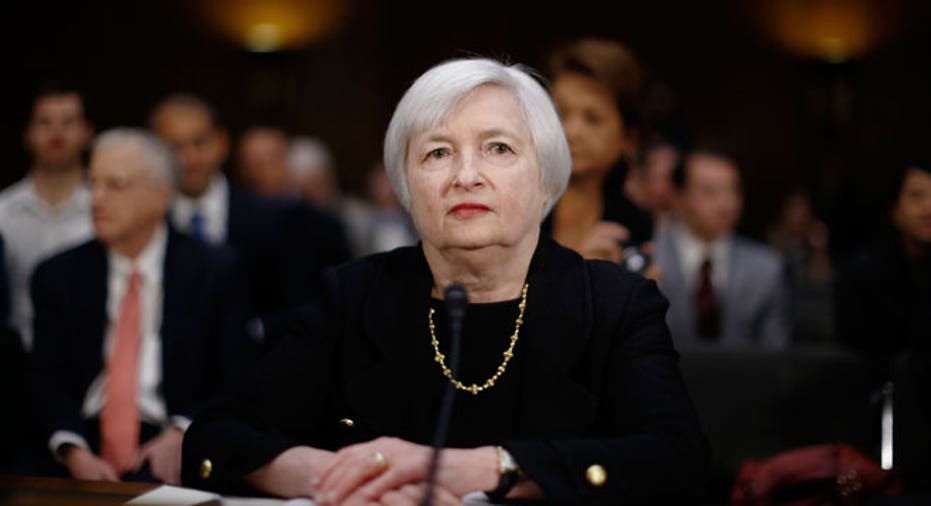Yellen Should Remain Cagey Over Rate-Hike Timing

Federal Reserve Chair Janet Yellen will answer a whole lot of questions on Tuesday and Wednesday during her semi-annual monetary policy testimony before two separate Congressional committees.
There’s one question she won’t be answering, however, and it’s the one question everyone wants answered: When will the Fed start raising interest rates?
Yellen has been asked the same question in countless forms over the past few months and her answer has always been the same: rates will start to move higher when the Fed determines that the economy is strong enough to absorb higher borrowing costs.
In all likelihood, the questions from the Congressional committee members grilling her over the next two days will require her to come up with numerous variations of that response during her testimony.
Analysts say Yellen should resist the temptation to offer more specifics.
“While it is true that unemployment is already where the (policy setting Federal Open Markets Committee) thought it would be at the end of this year and inflation is already higher, it is too soon for Yellen to shift gear and start signaling clearly that policy is likely to tighten sooner and/or faster than the market expects. There is still simply too much uncertainty around the state of the economy and the appropriate path of policy for Yellen to do that,” said Roberto Perli, an analyst with research firm Corner Stone Macro.
Currently, Fed economists and a broad consensus of analysts believe rates will start to rise in mid-2015. But the truth is that Fed policy makers don’t really know precisely when they’re going to start raising rates. They can’t.
Perli said Yellen should reiterate her oft-stated position that all Fed policy decisions are data-dependent. With that point made clear, Yellen might suggest that rates could move higher sooner than anticipated if the data comes in stronger than expected.
“But she will likely cast this as a hypothetical, while also stating that if the economy stops making progress tightening will take place later. In other words, she will most likely keep all options open,” said Perli.
Specifically, the data the Fed is looking for is unemployment in a range of 5.2%-5.6% and inflation ranging from 1.7% to 2%. That would fulfill the Fed’s dual mandate of full employment and price stability.
Both economic indicators are gradually moving in the direction of those thresholds, but there’s no telling exactly when they’ll reach those targets.
Message of Stability
Mark Williams, a former Fed examiner who now teaches banking at Boston University, said the most important message Yellen needs to convey is one of stability.
“She needs to send the message that the course is going to be steady and that she has a firm hand on the rudder,” Williams said.
Yellen will undoubtedly be asked about an internal debate now raging within the Fed between inflation doves like Yellen and inflation hawks like Dallas Fed Chief Richard Fisher. The doves are leaning toward a later-rather-sooner approach toward lifting rates so as not to upset the fragile recovery, while the hawks believe waiting too long to raise rates invites runaway inflation.
So far the doves are winning. But cases can be made either way and outspoken Fed members have been doing just that.
Unemployment has been dropping rapidly, falling to 6.1% in June, its lowest level in nearly six years. And job creation has been robust: over the past three months monthly job growth has averaged 272,000 new positions. Yet other elements of the labor market have been weak, namely wages, which have been mostly stagnant through the first half of 2014.
Inflation was also ticking higher recently due to higher prices for such consumer staples as food and energy. But those prices have stabilized in recent weeks.
“More economic data is supporting the counterargument that the Fed is not behind the curve and that delaying a rate increase is actually helping to sustain economic growth,” said Williams.
Williams said Yellen needs to use her testimony on Tuesday and Wednesday to “counterbalance the inflation hawks” because the economic numbers continue to “support a slow growth economy with little inflation insight.”
The recent increases in consumer prices and job numbers are “over-hyped,” according to Williams, and the likelihood of a rate increase action by 2015 is “overstated.”
“Yellen needs to tear a page out of the book from Margaret Thatcher the Iron Lady and convey the strong message that the Fed will maintain the course only moving in incremental and well thought-out steps. To get too specific only undermines the Fed’s flexibility when implementing future monetary policy,” said Williams.



















